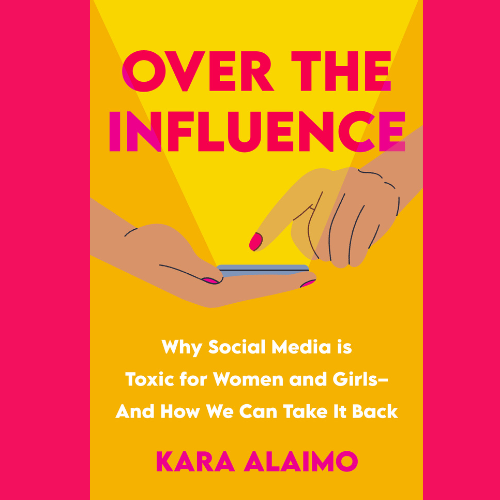Filtered
Think of the last picture you saw of yourself. It was probably taken pretty recently, right? That’s a huge shift that has happened in our lifetimes. When I interviewed plastic surgeon Dr. Dennis Schimpf for my new book, he pointed out that, before social media, most of us only had our photos taken at special occasions like birthday parties and weddings. But now, thanks to our phones and these apps, many of us are constantly bombarded with images of ourselves. It’s one of the things that Schimpf says has contributed to a huge rise in body dissatisfaction and plastic surgery recently. The vast majority of the people getting all this plastic surgery are women (of course).
In “Over the Influence: Why Social Media is Toxic for Women and Girls – And How We Can Take It Back,” my book published on March 5, I write about how social media is affecting every aspect of women’s lives – from the teen years to our romantic relationships, careers, and how we parent our kids. I also look at the huge impact social networks have had on our body images.
On social apps, we’re not just besieged with photos our friends may have taken at our last get-together. We’re also deluged with images of other people’s bodies. But I write in the book that while most of us knew on some level that we shouldn’t compare ourselves with the supermodels of the 1980s, there’s more of a sense these days that many of the influencers we follow online are people just like us – and that our bodies and lives should therefore look like theirs.
Of course, their photos are often heavily filtered and unrealistic. In fact, as I write in “Over the Influence,” the so-called Instagram body (which The New York Times describes as “an extreme hourglass shape, [and] a flat tummy, with voluptuous hips and buttocks”) doesn’t tend to naturally occur on women – it usually requires surgery. But it’s easy to lose sight of that fact when so many of the pictures we find in our feeds have the same aesthetic.
I also argue that social media has invited people to judge women’s bodies more than ever before. A picture of a woman is posted online – maybe she’s a celebrity, maybe not – and the whole world thinks it’s appropriate to weigh in on how she looks and whether she’s authentic or “fake” with comments people would probably never have the audacity to say to her face. The fact that men don’t come up against the same volume and kinds of judgments is so obvious that it almost feels silly to type the words.
As mamas, of course, we’re not only dealing with these issues ourselves but also have to prepare our kids for a world which I think is in many ways much uglier than it was before all these apps came on the scene. But having to teach our kids important life lessons (ones that many of us who aren’t digital natives were never taught ourselves) also gives us an opportunity to remind ourselves of them. One of the biggest, of course, is that we shouldn’t judge anyone – including and even especially ourselves – for their appearances.
In “Unshrinking,” Cornell philosopher Dr. Kate Manne’s hugely important book about our society’s fatphobia that was published in January, Manne shares the beautiful way she taught this to her own daughter. “I pulled up Instagram on my phone and showed my daughter bodies,” she writes. “I showed her fat bodies and Black and brown bodies and trans bodies and the bodies of people who are disabled and have skin and limb and facial differences and more … I showed her the bodies of other people viewed not through the lens of judgment – not even a generic positive evaluation – but of respect and kindness, of gratitude and gladness that they are here in the world among us.” We all need to teach our kids – and remind ourselves – to use apps this way.
In my book, I also call on tech companies to disclose when images on their sites have been altered. That would serve as an important (constant) reminder to all of us that so many of the images we’re seeing aren’t realistic depictions of other women’s bodies. But I’m not holding my breath.
We’re moms, after all, so we’re used to dealing with messes made by other people. The world created by social apps certainly isn’t pretty. It helps to remind ourselves that the idealized images we’re seeing online aren’t real – and, instead of buying into them, find healthy communities to follow that don’t present women this way (hello, Mama Beasts, for starters!). If you want to join mine, you can find me on Instagram, Facebook and or come chat with me on my national book tour.
Kara Alaimo, PhD is Associate Professor of Communication at Fairleigh Dickinson University and author of Over the Influence: Why Social Media is Toxic for Women and Girls – And How We Can Take It Back.”


